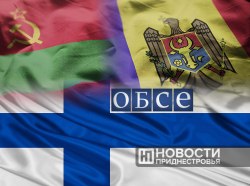Last week the mass media focused again on the peacekeeping operation held under the auspices of the Russian Federation. Journalists had several reasons for showing interest in this regard.
A draft law by Yuri Levchenko, an independent MP, had been published on the Verkhovna Rada web site. The bill provides for the denunciation of the agreement with Russia on the transit of the Russian military through the Ukrainian territory to Pridnestrovie.
According to experts, this initiative is in time with Ukraine's contemporary foreign policy — implementation of the tactics aimed «defrosting» the Pridnestrovian conflict, which was announced by Ukraine's president and is likely to be approved by Ukraine's MPs.
It should be noted that this agreement was signed between Russia and Ukraine on 25 December 1995 in Sochi, Russia. The approval by Ukraine's parliament of the above-mentioned draft law will mean that Ukraine denounces the international agreement signed with Russia on the transit of the Russian troops. The Russian contingent has been participating in the peacekeeping operation and supporting the Operational Group of Russian Forces (OGRF) in Pridnestrovie for 23 years, including guarding of ammunition depot in Kolbasna.
Although, in fact, the agreement has not worked since March 2014 when Ukraine imposed restrictions on transit of cargoes transported across the Ukrainian-Pridnestrovian border, including clothing allowance for Russia's peacekeepers. Since that very moment Ukraine has begun to restrict freedom of movement for the Russian troops and ordinary citizens going to Pridnestrovie. Therefore, the bill submitted by Ukraine's MPs is the legal implementation of the previously taken decision.
It is evident that such moves are aimed driving out the Russian military from Pridnestrovie, although Kiev's role in the peacekeeping operation is being compromised in that. We recall that Ukraine's military observers participate in the peacekeeping mission, and the neighbouring state is a guarantor in the negotiation on the Pridnestrovian settlement.
«The goal of these actions is clear. It aims at creating conditions for driving out the peacekeepers from here and goes within the framework of the declarations Moldova's spokespersons make from time to time that the format of the operation should be transformed. These actions are being carried out, regardless of the fact that the conflict has not been resolved," said President Yevgeny Shevchuk on Radio 1.
The day before the draft law was published the deputy prime minister on reintegration, Viсtor Osipov, had drawn the media's attention one more time, when he said on Moldova's Prime TV channel that the peacekeeping operation on the Dniester was inefficient and even dangerous.
It looks like a specific sequence — every time this sort of rhetoric grows more acute ahead of certain events. We can recall the signing of the association agreement between Moldova and the EU. It is then Moldova's president and foreign minister were complaining of the deployment of the Russian military in the region, calling it «actual occupation» and stressing the necessity to transform the peacekeeping format. The work of the JCC governing body was blocked the following day, by the way. After that the sides could not agree on the agenda for 9 months.
However, back to the recent statements by Moldova's official. It is only fair to note that a desire of Moldova's leadership is not enough — there is no adequate alternative to the existing peacekeeping format today. And Victor Osipov did not dispute this point.
«There is no chance of getting rid of the peacekeeping forces in the near future. I am a realist. This goal has been on the government's agenda for many years," said Victor Osipov.
According to the head of the Pridnestrovian delegation to the JCC, Oleg Belyakov, history has shown there is no real alternative to the existing peacekeeping mechanism. He underscored that such statements served as an information background for compromising the guarantee operation.
«Those who are experienced can understand perfectly well that the events of 1992 put an end to this issue. It is evident that the presence of civilian observers had not prevented Moldova from launching the military aggression against Pridnestrovie. The Pridnestrovians had to rescue the international observers and take them out of the battle zone," said Oleg Belyakov in an interview with a Novosti Pridnestrovia reporter.
He said there are no implications today to stop the peacekeeping operation.
«There are no prerequisites today for finishing the peacekeeping operation. We still see differences between the conflict sides have remained rather serious. Moreover, the documents signed as follow-up to the 1992 agreement do not work today. The Moldovan side has unilaterally exited a law-enforcement agreement, as well as two-sided agreements between other agencies," concluded Oleg Belyakov.
It is evident that consequences could be unpredictable in case the peacekeeping operation is transformed. The conflict sides have no document that could guarantee renunciation of the use of force. It means in such a scenario Pridnestrovie's and Moldova's troops will look at each other via weapon sights at the contact line, and any shot may lead to armed confrontation.








